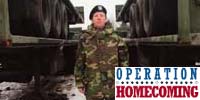Operation Homecoming: Among These Ruins


 5:10
Barrett Golding
5:10
Barrett Golding
Specialist Helen Gerhardt on her first days in Iraq.
Broadcast: Oct 1 2007 on HV PODCAST; Jan 1 2007 on NPR Day to DaySeries: Operation Homecoming Subjects: Literature, War, International
Army Specialist Finds Signs of Life in Iraq’s Ruins
January 1, 2007 from Day To Day
MADELEINE BRAND, host: From NPR News, this is DAY TO DAY. I’m Madeleine Brand.
Coming up on the program, we mark the deaths of more than 3,000 U.S. troops in Iraq by remembering the life of one – Marine Major Megan McClung. She was killed a month ago in a roadside bomb attack. First, we continue with our Iraq series Operation Homecoming. Ms. HELEN GERHARDT (Specialist, 1221st Transportation Company, Missouri National Guard): I’m Helen Gerhardt. I was a specialist with the 1221st Transportation Company of the Missouri National Guard. We were in Iraq from June of 2003 to July of 2004. BRAND: The National Endowment for The Arts asked U.S. troops returning from Iraq and Afghanistan to write down their experiences. Service men and women submitted more than 12,000 pages. And many selections now appear in the book "Operation Homecoming.” Specialist Helen Gerhardt contributed an essay based on an e-mail she wrote describing her first few days in Iraq. Ms. GERHARDT: Dear friends and family, a few days ago I sat on a passenger seat of a truck with my M16 pointing out the window as I crossed the border into Iraq for the first time. All of us methodically scanned the landscape for the flesh-and-blood snipers or grenade launchers we had envisioned during training and constantly glanced in the rearview mirror to make sure the truck behind us was at a safe distance. I felt greedy for every concrete detail to dispel the figments of the Iraq I constructed in my own imagination over the months of waiting. Our convoy of nine trucks and a Humvee felt very small to all of us. Our request for an MP escort had been denied without the required 48 hours notice, never mind that we’d been ordered onto the road with only about 36 hours warning. The MPs are stretched very thin, and though officially all convoys are supposed to be escorted, in reality most small groups go without. The first face I saw closely was a girl maybe 10 years old, thin, but beating time on a half-full water bottle as she danced up and down on the shoulder of the road with confident grace. She looked straight into my eyes with no trace of humility. Her brilliant smile seemed to command acknowledgement of a beauty impossible to deny anything to. Her cinnamon and curry-colored gown waved like a flag of bold pleasure in her past triumphs. I wished I could throw roses and roast beef, confetti and corndogs, wanted to celebrate her gutsy contrast to my worst fears and to get a good square meal into her belly. Behind her, an older woman stood still and straight, wrapped in black, staring through her daughter and me to the desert beyond. The next day, we were scheduled to pass to the outskirts of Baghdad, near where the members of another mission had seen the smoking remains of a 915 truck after it had been hit rocket-grenaded. We took a wrong turn off the highway, and unable to read the Arabic street signs, wandered into the slums of Sadr City where children pointed and laughed as our long convoy of illiterates passed back and forth through the narrow streets, looking for a way out. The adults barely glanced at us, faces surely schooled into stone by years of threats by those who held rifles and the keys to prisons that swallowed many sons, fathers and husbands whole without a word. People were amazingly, surprisingly friendly when we were first there. People running to the trucks, especially the children - the children are great barometers, really, of how the adults are feeling. The adult population had had years of training in a kind of neutrality of expression toward those in power. But where there was real support for us, the kids, they were very, very friendly when we were first there. As time went on and things were not going well, we saw a significant change, and especially after Abu Ghraib happened. People wouldn’t even look at us. (Soundbite of music) BRAND: Helen Gerhardt, she’s pursuing an MFA in Creative Nonfiction at the University of Pittsburgh. She’s also writing a book about her unit in Iraq. You can hear more from her interview and read her essay at our Web site NPR.org. Next week, our Operation Homecoming series continues. We’ll hear from a sergeant who writes a frustrated e-mail home after attending two funerals in the same day.
